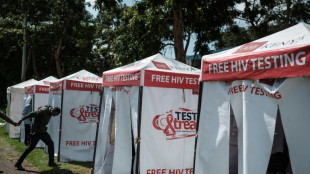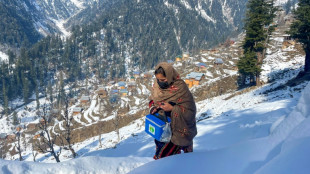
-
 WHO worker aims to raise $1 bn to cover US pullout
WHO worker aims to raise $1 bn to cover US pullout
-
Tesla sales fall in Germany as Musk backs far right

-
 US trade gap swells as Trump renews scrutiny of deficits
US trade gap swells as Trump renews scrutiny of deficits
-
M23, Rwanda troops launch fresh east DR Congo offensive

-
 International backlash after Trump proposal to take over Gaza
International backlash after Trump proposal to take over Gaza
-
'People are going to die': USAID cuts create panic in Africa

-
 Hermoso pressured to downplay kiss, brother tells Spain court
Hermoso pressured to downplay kiss, brother tells Spain court
-
MotoGP champion Martin breaks hand and foot in Malaysia crash

-
 US trade gap swells in 2024 as deficits under fresh scrutiny
US trade gap swells in 2024 as deficits under fresh scrutiny
-
Aga Khan: five things about the prince of sport

-
 Rubio sees Guatemala leader keen to please US
Rubio sees Guatemala leader keen to please US
-
Swedish king leads mourning after school massacre

-
 US Postal Service halts China suspension after stoking trade fear
US Postal Service halts China suspension after stoking trade fear
-
Steel decline sparks protests and a movie in Belgium

-
 Root 'crucial' for England ahead of Champions Trophy, says skipper
Root 'crucial' for England ahead of Champions Trophy, says skipper
-
Chelsea star Kerr 'feared for my life' during taxi ride

-
 India's Rohit insists struggles 'nothing new' ahead of England ODIs
India's Rohit insists struggles 'nothing new' ahead of England ODIs
-
Even in career twilight, Ronaldo's star undimmed at 40

-
 Barca avoiding 'excuses' after Real Madrid ref complaints: Flick
Barca avoiding 'excuses' after Real Madrid ref complaints: Flick
-
Australia fear rank turner for second Sri Lanka Test

-
 EU seeks new import fee on e-commerce packages
EU seeks new import fee on e-commerce packages
-
Oscars frontrunner 'Emilia Perez' suffers awards season crash

-
 Swedish police say school killing spree gunman likely shot himself
Swedish police say school killing spree gunman likely shot himself
-
Stocks, dollar drop as tariff tensions intensify

-
 Oil giants TotalEnergies, Equinor reduce low-carbon investments
Oil giants TotalEnergies, Equinor reduce low-carbon investments
-
Kremlin calls Zelensky's readiness for Putin talks 'empty words'

-
 Trump bid to take over Gaza, move Palestinians faces backlash
Trump bid to take over Gaza, move Palestinians faces backlash
-
Liverpool's Slot not a fan of in-stadium VAR announcements

-
 Stiff competition awaits as Vonn hunts gold in world super-G
Stiff competition awaits as Vonn hunts gold in world super-G
-
Pakistan health workers kick off polio drive despite snow

-
 Austria's Puchner tops second downhill training at world champs
Austria's Puchner tops second downhill training at world champs
-
Bid to sell Suu Kyi's Myanmar mansion flops for third time

-
 Aga Khan: racehorse billionaire and Islamic spiritual leader
Aga Khan: racehorse billionaire and Islamic spiritual leader
-
China slams US 'suppression' as trade war deepens

-
 Sri Lanka's Karunaratne to bow out of Tests after 'fulfilling dream'
Sri Lanka's Karunaratne to bow out of Tests after 'fulfilling dream'
-
Philippine House votes to impeach VP Sara Duterte

-
 Tokyo police bust alleged prostitution ring targeting tourists
Tokyo police bust alleged prostitution ring targeting tourists
-
Baltics to cut Soviet-era ties to Russian power grid

-
 Iraq's famed 'hunchback' of Mosul rebuilt brick by brick
Iraq's famed 'hunchback' of Mosul rebuilt brick by brick
-
Stock markets stutter as traders weigh China-US trade flare-up

-
 Hamas rejects Trump proposal to take over Gaza, move Palestinians
Hamas rejects Trump proposal to take over Gaza, move Palestinians
-
MotoGP champion Martin taken to hospital after Malaysia crash

-
 YouTubers causing monkeys to attack tourists at Cambodia's Angkor Wat
YouTubers causing monkeys to attack tourists at Cambodia's Angkor Wat
-
Sweden reels from worst mass shooting in its history

-
 India's Modi takes ritual dip at Hindu mega-festival
India's Modi takes ritual dip at Hindu mega-festival
-
Nissan shares fall as reports say Honda merger talks off

-
 US Postal Service says suspending parcels from China
US Postal Service says suspending parcels from China
-
Toyota announces Lexus EV plant in Shanghai

-
 Santander reports record profit for third straight year
Santander reports record profit for third straight year
-
No new clothes: S. Korean climate activist targets hyperconsumption


Stung by drought, Morocco's bees face disaster
Morocco's village of Inzerki is proud to claim it has the world's oldest and largest collective beehive, but instead of buzzing with springtime activity, the colonies have collapsed amid crippling drought.
Beekeeper Brahim Chatoui says he has lost almost a third of his hives in just two months -- and he is not alone.
"At this time of year, this area would normally be buzzing with bees," said Chatoui, sweating under a blazing springtime sun. "Today, they're dying at a terrifying rate."
The North African kingdom has seen a dramatic spike in mass die-offs of the critical pollinators, a phenomenon called "colony collapse disorder".
Worldwide, experts say such sudden mass deaths of bees are often linked to the destruction of nature and the rampant use of pesticides.
But authorities in Morocco say these collapses are caused by the worst drought to hit the country in 40 years, which has decimated the plants on which bees rely for food.
- 'Unprecedented' spike -
The crisis is so acute that the government released 130 million dirhams ($13 million), to support beekeepers and investigate the cause of the bee deaths.
Morocco's National Food Safety Office, which carried out the investigation, ruled out disease as a reason.
Instead, it blamed the "unprecedented" spike in hive collapses on an intense drought driven by climate change.
Inzerki's unique collective beehive sits on a sunny hillside in the heart of the Arganeraie Biosphere Reserve, a UNESCO-protected 2.5-million-hectare region, some 415 kilometres (260 miles) southwest of the capital Rabat.
The complex is striking: A five-storeyed structure of wooden struts and dry mud stretch along a hillside, each compartment home to a cylindrical wicker hive, covered with a mix of earth and cow dung.
Experts say it is the oldest traditional, collective beehive in the world, dating back to 1850, but today it is under threat amid a changing climate.
"This year we hope for rain, because I have lost 40 hives so far," Chataoui said.
Bee expert Antonin Adam, who has studied the insects in southwestern Morocco, also blamed the collapse on the drought.
But he added the problem may have been exacerbated by "the bees' vulnerability to diseases, nomadic pastoral practices, intensive agriculture and the country's desire to increase its honey production".
That desire is clearly visible in agriculture ministry figures.
Honey output has risen by 69 percent in a decade, from 4.7 tonnes in 2009 to almost eight tonnes in 2019, generating revenues of over 100 million euros.
But it is not only Inzerki's apiary that is in trouble.
Mohamed Choudani, of the UAM beekeepers union, said the crisis was hitting bee populations across the country.
Last summer, Morocco's 36,000 beekeepers were managing some 910,000 hives, up by 60 percent since 2009, according to official figures.
But Choudani said that since last August, 100,000 colonies had been lost in the central region of Beni Mellal-Khenifra alone.
Bees and other pollinators are vital for the reproduction of more than three-quarters of food crops and flowering plants.
The UN's Food and Agriculture Organisation (FAO) say bees play an "essential role... in keeping people and the planet healthy", with the UN saying they "serve as sentinels for emergent environmental risks, signalling the health of local ecosystems".
- 'Exceptional legacy' -
For the villagers of Inzerki, the collapse of hives is an ecological and economic disaster -- but also a crisis for their unique heritage.
Chatoui, the beekeeper, said many Inzerki residents can't afford to revive the hives they have lost.
"Some families have decided just to give up on beekeeping completely," he said.
The hives at Inzerki are in trouble. Parts of the structure, recently listed as a national heritage site, are sagging.
Geographer Hassan Benalayat says the neglect is due to several factors on top of climate change, including the arrival of modern agriculture and a general exodus from the countryside.
Around 80 families in the village once kept bees. Today there are less than 20.
"It's urgent to keep this exceptional legacy alive," Benalayat said.
Chatoui and other villagers have set up an association to restore the structure, as well as planting herbs for the bees that are better able to tolerate hot and arid conditions.
"The situation is critical, but that doesn't mean I'm giving up," Chatoui said.
"The aim isn't to produce honey, but to protect the hives and make sure the bees survive until better days."
N.Fournier--BTB
